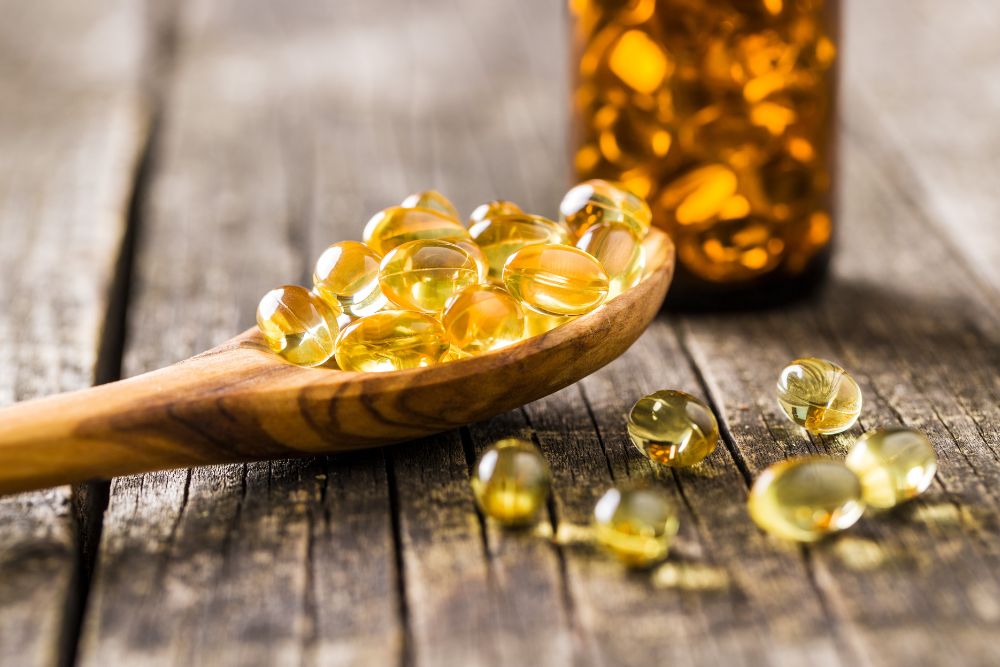Omega-3 fatty acids are a family of polyunsaturated fats vital for cellular function and hormone production. Powerful antioxidants with anti-inflammatory properties, these nutrients may benefit immunity, cardiovascular and endocrine health, cancer, and other conditions. They’ve been shown to improve fertility outcomes for men, particularly for sperm health and function. Omega-3 fatty acids are essential fats, meaning outside sources like foods and dietary supplements are required for their production.
What Are Omega-3 Fatty Acids?
Omega-3 fatty acids, also known as omega-3 fats or n-3 fats, are fat molecules considered “healthy fats.” Specifically, there are three types of omega-3s1:
- Eicosapentaenoic acid (EPA)
- Docosahexaenoic acid (DHA)
- Alpha-linolenic acid (ALA)
Cold-water, fatty fish are the main source of EPA and DHA2, and the best options for both include mackerel, salmon, herring, anchovy, whitefish, tuna, halibut, and sardines. ALA, used for energy, is considered the most common omega-3 type among Western diets. Among its sources are vegetable oils, nuts, flax seeds, leafy vegetables, and some animal fat.
How Do Omega-3 Fatty Acids Improve Male Fertility?
Omega-3 fatty acids are crucial to all cellular structure and formation, including sperm cells.
Antioxidant Properties
Omega-3 fatty acids are a valuable source of antioxidants, which are nutrients that protect against cellular damage. As such, omega-3 fatty acids may help to reduce oxidative stress3 and resulting inflammation, which may support sperm function. The stress and inflammation may also significantly contribute to or cause male fertility issues. For sperm health, research suggests that both omega-3 supplementation and dietary sources may increase antioxidant activity in human seminal fluid.
Benefits of Omega-3 For Sperm Health and Function
Omega-3 fatty acids may improve sperm quality, count, motility (i.e. movement), and morphology (i.e. shape). They’ve been shown to help men with infertility caused by low sperm count and motility4, a common condition called oligoasthenoteratozoospermia (OAT) syndrome. DHA, in particular, may support sperm quality and count5.
Omega-3 fatty acid supplementation may help to protect the sperm’s acrosome6, which is the oval-shaped front part of the sperm’s head with a cap-like covering. It contains enzymes that break down the egg cell’s outer membrane, enabling fertilization. But some men’s sperm cells have round heads and no acrosome, a condition called globozoospermia. In these cases, sperm are unable to fertilize an egg cell, leading to infertility.
How Should I Consume Omega-3 Fatty Acids?
While most health organizations recommend that healthy adults consume between 250-500 mg of omega-3s daily, fertility specialists or medical providers may advise you to take over 2,000 mg daily. As most Americans fail to meet the recommended daily levels through food alone, supplementation is often advised.
Shop Omega-3 Supplements To Improve Male Fertility
Looking for an omega-3 supplement to support your fertility and boost your sperm health? Nutrabloom’s Omega-3 + DHA supplement contains optimal levels of EPA and DHA, the two key omega-3 fatty acids in fish. As with all our supplements, our Omega-3 + DHA formula undergoes third-party testing and is made without any yeast, wheat, gluten, milk, egg, or shellfish ingredients. This all-natural supplement provides you with the nutrients you need to live your best life in a convenient softgel.
Suggested use: Take two softgels per day with food or as recommended by your healthcare provider.
To further support your sperm health and fertility journey, we recommend our Men's Fertility Strength Kit or Men’s Fertility Strength Kit Plus.
Sources:
- https://www.hsph.harvard.edu/nutritionsource/what-should-you-eat/fats-and-cholesterol/types-of-fat/omega-3-fats/
- https://fdc.nal.usda.gov/index.html
- https://pubmed.ncbi.nlm.nih.gov/28508879/
- https://www.ncbi.nlm.nih.gov/pmc/articles/PMC3720081/
- https://pubmed.ncbi.nlm.nih.gov/25951427/
- https://www.ncbi.nlm.nih.gov/pmc/articles/PMC7025069/




